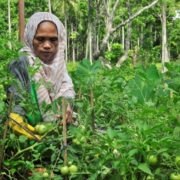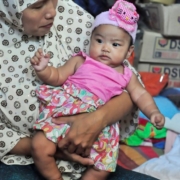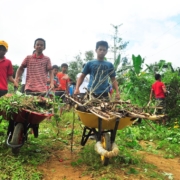A FRESH START
On May 23, 2017, conflict broke out in Marawi City between the Armed Forces of the Philippines and armed fighters from two ISIL-affiliated groups – Abu Sayyaf and the Maute. This led to a 5-month siege that destroyed most of the city’s central commercial district and forced 350,000 people to evacuate their homes. 5% of the evacuees stayed in evacuation centers while 95% choose to stay with relatives and friends in nearby communities.
The host communities where the evacuees stayed were caught unprepared with the massive influx of people. Food, health, water, sanitation and other basic services for the displaced population were severely compromised. Action Against Hunger personnel were on the ground two days after the conflict started to assess the situation and determine the urgent humaniarian needs of the affected population. Emergency Response projects in Food & Nutrition, Water, Sanitation & Hygiene (WASH), Food Security and Livelihoods, and Shelter started on June 1, 2017 and continues to this day.
These are the voices of the people who endured the Siege of Marawi through resilience and determination.
On May 24, 2017, the morning after the conflict started in Marawi City, Noraida Ombar and her family left their home in Brgy. Lilod Madaya. With no means of transportation, she, her husband, and her 11 children walked for more than two hours to Brgy. Alinun, Saguiaran where her brother waited.
“My children almost fainted because of the heat and the exhaustion. We were so scared that we didn’t notice how hungry we were until we arrived here,” she said.
Her brother Macalayo welcomed them to his house where other displaced relatives also took refuge. She noticed that the sack of rice her brother gave to all the visitors was soon empty as more displaced relatives came in the succeeding days.
Knowing that their hosts also have their own families’ needs to take care of, she and her family relied mostly on the food aid that the government and other humanitarian organizations were giving.
However, the distance of Brgy. Alinun from the town center made delivery of the food aid inconsistent. And when government food aid did come, it was not enough for her large family. The week’s supply of food only lasted for a few days.
This food insufficiency was noted by the Action Against Hunger mobile team when they passed Brgy Alinunin on September 2017. The organization was doing an assessment of the needs of the displaced families who choose not to live in evacuation centers. According to data from UNOCHA, 94% of the 360,000 people who were forced to flee opted to stay with relatives.
With funding from the Swedish International Development Cooperation Agency (SIDA), Action Against Hunger distributed food aid kits enough for a month’s food supply for each family in the Barangay. When Noraida opened her family’s kit, she was pleased to find dried fish, eggs, cooking oil, biscuits, mung beans, fruits and vegetables.
“We had been eating so much canned food that having fresh food we can cook was a relief for us,”, she said
The first meal that she cooked and shared with her family reminded her how good wholesome fresh and nutritious food was for them. Before long, she and her husband were cultivating rice substitutes like cassava, taro and sweet potatoes on a patch of land that her brother lent them. However, backyard farming with only a few tools they borrowed from their new neighbors was tedious.
Action Against Hunger engineers were building a communal toilet and installing a water reservoir in her community at this time. Noraida asked if she could have the construction tools to use for farming once construction was done. When the structures were completed, they gave her a shovel, a rake, a trowel, shears, a hoe, gloves and a wheelbarrow.
Farming was more efficient with these tools, so much so that Noraida added more variety and planted tomatoes, spring onions, okra, eggplant, bell peppers and other vegetables.
“We can’t go on relying on food aid or be a burden to our relatives. At least, with this garden, we could grow some nutritious food for our everyday consumption,”, she said.
When they harvested some of their crops for the first time, their fellow refugees were encouraged to follow their example. Noraida lent them the tools and they also started their own backyard farms. They are now planning to ask the barangay to use some of the idle lands to start a communal vegetable garden●





